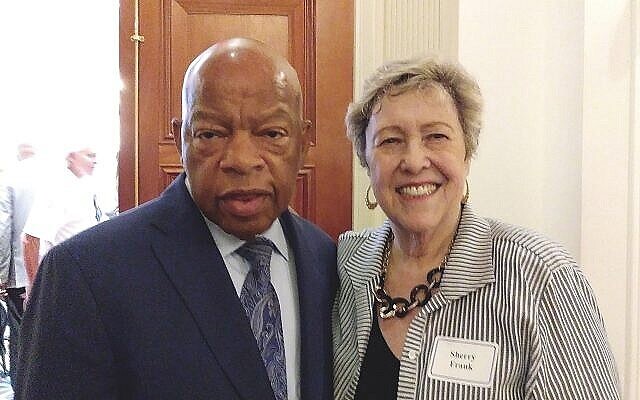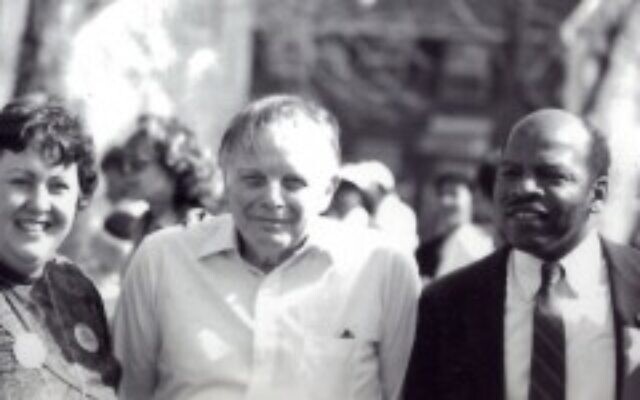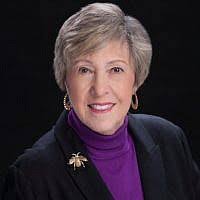Farewell to My Hero John Lewis
Decades of treasured memories of a steadfast friend of Israel and the Jewish community.

Martin Luther King, Jr. spoke about the beloved community. John Lewis’s life was an embodiment of that dream. Congressman Lewis lived every day reaching out to anyone who passed his way. “Black and white, straight and gay, Christian, Muslim or Jew, we are one people, one family, one house,” he repeatedly told us.
I was fortunate to be among the millions whose lives were touched and enriched by this amazing man of humility, integrity and purpose. I met John when he was an Atlanta City Councilman and he spoke at a meeting I organized for the American Jewish Committee (AJC). We invited a group of Black and Jewish community leaders to discuss the renewal of the Voting Rights Act. Jewish civil rights activist Cecil Alexander introduced John.
This meeting ignited a passion among the participants to work together, as Jews and Blacks had done in the 1960s for voting rights. John and Cecil became the founding co-chairs of the Atlanta Black-Jewish Coalition, a position John held for four years until he was elected to Congress.

Through the coalition, John Lewis raised his voice in support of a hate crimes bill, a posthumous pardon for Leo Frank, and a Martin Luther King Jr. Day national holiday. He repudiated the vile hate-filled statements of Minister Louis Farrakhan and denounced anti-Semitism throughout his years in public life.
Lois Frank and I shared treasured memories marching together alongside Congressman Lewis against “Fear and Intimidation in Forsyth County” and commemorating the 25th and 30th anniversaries of the March on Washington.
My most memorable event was observing the 20th anniversary of the march across the Edmund Pettus Bridge. We gathered at The Temple to retell the story of the 1958 bombing and board the bus for Selma. Rabbi Alvin Sugarman marched at the front of the line, as Rabbi Abraham Joshua Heschel had done in the 60s, and he kneeled to pray before descending the crest of the bridge. In tears, Rabbi Sugarman described how it felt 20 years after Bloody Sunday, the marchers looking down at the sea of reporters, replacing the dogs, billy clubs and police of years gone by.
As I worked with John, I got to know and love his wife Lillian and their son John Miles. Lillian and I planned our sons’ birthday parties together when we learned John Miles and my son, Drew, were both born on May 24, 1976. When John ran for Congress and he and Lillian spent 24/7 campaigning, John Miles spent most weekends all summer at my house. As John was sworn into Congress, Drew and John Miles were sitting in the chair with him, and Lillian and I looked down from the gallery.
Lillian and John became part of my family, dancing at my daughters’ weddings and even attending my adult bat mitzvah that I shared with Jeanney Kutner. I was honored to speak at Lillian’s funeral.
Shortly after becoming a member of Congress, John spoke to fourth graders at The Epstein School. Drew introduced him. Nearly 30 years later, as principal and assistant head of school at The Davis Academy, Drew once again introduced John Lewis to students, faculty and family before the congressman spoke and signed his books.
I valued the professional role we shared in working for causes near and dear to both of our communities. He stayed close to AJC and the Black-Jewish Coalition, often participating in our young leadership retreats. He surprised participants when he walked in to join them for dinner and remained late into the evening, negotiating honest and sometimes heated discussions.
Under the talented leadership of AJC’s Regional Director Dov Wilker, the coalition continues to build bridges and foster dialogue. As AJC’s national director of Black-Jewish relations, Dov helped launch the Congressional Caucus on Black-Jewish Relations. Congressman Lewis was a founding member of this caucus.
John visited Israel with several congressional delegations and was a steadfast supporter of Israel, continually voting in favor of its security needs and acknowledging its right to be judged fairly among the community of nations. In 2019, he denounced BDS.
John was co-chair of the Congressional Coalition for Soviet Jews’ freshman class. He was advised not to raise the issue of Soviet Jewry when he attended a human rights conference in Moscow as a freshman legislator. This man of giant conscience rose, as always, to the occasion. In addressing the members of the Supreme Soviet, he said, “I will not be satisfied, will not be patient, as long as a Jew cannot be Jewish in his own country. I cannot be satisfied or patient as long as one person of conscience is held in prison.”
I love the picture Ronnie van Gelder hung in her office at The Temple marching with John on December 6, 1987 – Freedom Sunday – on the eve of the Reagan-Gorbachev summit. Congressman Lewis stirred the crowd of thousands when he belted out, “Twenty-five years ago, I marched here in Washington to focus the nation’s attention on the injustices and the oppression of segregation. Many of my Jewish friends were with me then, and today I am proud to take part in your march for freedom for your people who are oppressed in the Soviet Union.”
Prior to my 25 years as AJC’s Southeast area director, I was a leader in the National Council of Jewish Women (NCJW). Back again as president of our Atlanta Section, I am proud of the decades of connections we have had with Congressman Lewis. In 2017, I introduced John at our national convention in Atlanta when he received NCJW’s Faith in Humanity Award. With a standing ovation, he left the podium to the music of Pharrell Williams’ “Happy” and danced into the crowd of activist women who enthusiastically joined with him.
On my last trip to D.C. in 2019, attending NCJW’s Washington Institute, we met in John’s office to thank him for his ongoing support for reproductive freedom, voting rights, gun safety and judicial nominees. We were pleased to see, among his numerous awards on display, the bust of Hannah Solomon, NCJW’s founder, among them.
As I visited with John just a few days before his death, I said, “goodbye and I love you. You will always be my cherished friend, and ‘the boy from Troy.’” He smiled and closed his eyes. May his memory forever be a blessing.
Sherry Frank, a longtime community activist, is president of the NCJW Atlanta Section, former AJC Southeast area director and a co-founder of the Atlanta-Black Jewish Coalition.
- Opinion
- Community
- Tribute
- John Lewis
- American Jewish Committee
- Voting Rights Act
- Cecil Alexander
- Atlanta Black-Jewish Coalition
- Leo Frank
- Hate Crimes Bill
- Anti-Semitism
- Lois Frank
- March on Washington
- Edmund Pettus Bridge
- The Temple
- 1958 Temple bombing
- Rabbi Alvin Sugarman
- Rabbi Abraham Joshua Heschel
- Bloody Sunday
- John Miles Lewis
- Lillian Miles Lewis
- Ronnie van Gelder
- National Council of Jewish Women
- Dov Wilker
- Congressional Caucus on Black-Jewish Relations




comments